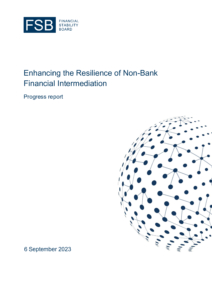Summary of document history
Recent episodes of market stress, including the March 2020 market turmoil, the Archegos failure in March 2021, the 2022 turmoil in certain commodities markets, and the September 2022 issues experienced by many pooled liability-driven investment (LDI) funds, underscore the importance of margin and collateral calls to financial stability.
While margin and collateral calls are a necessary protection against counterparty risk, they can also amplify the demand for liquidity by market participants in times of stress if they are unexpected and affect a large enough part of the market. The increase in such calls can impact market participants differently depending on the size of positions and level of liquidity preparedness. Weaknesses in liquidity risk management and governance by some market participants, were found to be the key causes behind inadequate liquidity preparedness for margin and collateral calls.
In response, this consultation report outlines eight cross-sectoral policy recommendations to enhance the liquidity preparedness of non-bank market participants for margin and collateral calls in centrally and non-centrally cleared derivatives and securities markets. They are proposed to apply proportionately with a focus on non-bank market participants with material exposures to spikes in margin and collateral calls during times of stress. The recommendations focus on:
-
Non-bank market participants’ liquidity risk management practices and governance with respect to managing and mitigating exposures to spikes in margin and collateral calls
-
Liquidity stress testing and scenario design for margin and collateral calls during normal market conditions, as well as in extreme but plausible stressed market conditions
-
Ensuring sufficient collateral is available, as and when required.
The aim of these recommendations is to reduce the excessive procyclical behaviour of some non-bank market participants in response to margin and collateral call. Enhancing market participants’ liquidity preparedness will help to mitigate the impact of such calls during times of market-wide stress.
The FSB is inviting comments on this consultation report and the questions set out below. Responses will be published on the FSB’s website unless respondents expressly request otherwise.
Consultation questions
Section 1
-
Does the outlined approach identify all key causes of some non-bank market participant’s inadequate liquidity preparedness with respect to spikes in margin and collateral calls during times of stress? Are there any sector specific causes that should be considered?
Section 2
-
Is the scope of the proposed policy recommendations appropriate?
-
Is the focus of the FSB’s policy recommendations on liquidity risk management and governance, stress testing and scenario design and collateral management practices appropriate? Are there any other areas the FSB should consider?
-
Is the approach to proportionality and materiality clear for all non-bank market participants?
Section 3.1
-
Section 3.1 sets out key elements of a liquidity risk management framework to identify, monitor and manage liquidity risk exposures arising from margin and collateral calls. Are these sufficiently clear for all non-bank market participants?
Section 3.2
-
Are the recommendations on liquidity stress testing and scenario design with respect to margin and collateral calls clear and sufficiently specified?
-
Are there any jurisdictional or sector-specific differences that are not accounted for in the recommendations?
Section 3.3
-
Collateral readiness at the right time, quality and location is a critical aspect of effective liquidity preparedness for spikes in margin and collateral calls to mitigate the risk of having to liquidate collateral under stressed market conditions. Do the FSB’s recommendations in Section 3.3 address all key elements required to be effective in mitigating liquidity risk arising from margin and collateral calls?
-
Are there any material challenges to collateral management practices that some non-bank market participants may face that should be considered?
Responses should be submitted via this secure online form by 18 June 2024. For questions, please contact the FSB ([email protected]).
